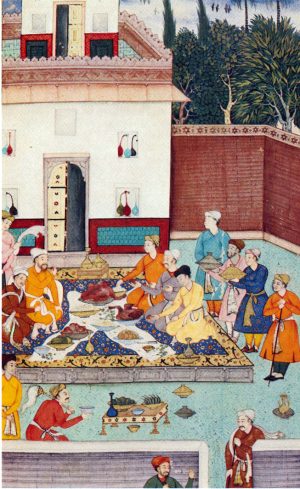The Indian government’s decision to remove significant sections from school Social Science and History textbooks has stirred controversy, as historians perceive it as an attempt to rewrite history.
The Hindu nationalist Bharatiya Janata Party (BJP) government is keen to regulate the history of India that children are taught in schools.
Last month, the Central Board of Secondary Education (CBSE) removed selected topics from school Social Science and History textbooks. Among the topics that were deleted from textbooks in grades 6 to 12 are the history of the Mughal courts, the communal riots in Gujarat, the Emergency, Dalit writers, the Naxalite (Maoist) movement, and the fight for equality.
While the CBSE described the exclusion of these topics as a “syllabus rationalization” exercise, the National Council of Educational Research and Training (NCERT), which publishes the textbooks followed by CBSE schools, said that the deleted content was “overlapping” and “irrelevant.”
Educationists, however, are not convinced. What the government dismisses as a mere “deletion” exercise, political scientist Suhas Palshikar argues “need(s) to be taken more seriously” as an “act of rewriting.” The revision, he writes, reveals the government’s vision of how it “imagines” democracy and state-citizen relations should be. The government, he says, intends “not to mention inconvenient facts.”
In response to a question in parliament on the “rationalization” exercise in NCERT textbooks, India’s junior Minister for Education Annapurna Devi said that during the pandemic, school children struggled to learn through online classes. Concerns were raised about “curriculum overload,” she said, justifying the deletion of topics from the textbooks.
However, there are more complex motivations behind the BJP government’s agenda to revise textbooks. It is rewriting India’s history. A look at deleted topics provides some useful insights.
An entire chapter on the contributions of the Mughals (a Muslim dynasty that ruled during the medieval period) and their manuscripts has been removed from the Grade 12 history textbook. The BJP and its Hindutva votaries have often argued that the NCERT texts currently in use give undue importance to Mughal rule. They want to shift the focus to the achievements of ancient India, which in their view is primarily a Hindu India. In their perspective, the medieval period was essentially a Muslim period, a view that historians have contested.
Drawing attention to “the deletion and downscaling of the Muslim/Mughal history from most of the textbooks,” eminent historian Irfan Habib argues that “the focus of all the curriculum changes” is based on “what pays maximum electoral dividends.” Those who revised the textbooks “seem to have only a single-minded agenda of implementing the regressive and sectarian vision, an exclusivist idea of India,” Habib writes.
In effect, they are promoting the Hindutva vision of India in school textbooks.
Some of the deletions point to a whitewashing of the record of BJP leaders. Prime Minister Narendra Modi was Gujarat’s chief minister during the riots in 2002. The deletion of this topic seems aimed at erasing this inconvenient fact from textbooks.
In addition, a critique on the Emergency that was imposed by former Congress Prime Minister Indira Gandhi, and the excesses that were committed during the 1975-1977 period when it was in force, has been removed from the Political Science textbooks. This deletion appears to be an attempt to remove from school curriculums any critical understanding of authoritarianism.
The removal of discussions of social inequality and caste-based discrimination from textbooks reflects the discomfort of Hindutva ideologues with any discussion of problems in Hindu society, such as caste-based oppression. Significantly, the chapter on inequality and the fight for equality by minority and marginalized groups has been deleted from the textbook on Contemporary India.
The BJP has always alleged that “distorted” history written by Marxist historians has been taught in schools hitherto and that this curriculum has ignored the history of Hindu kings and their contributions.
Consequently, when it came to power for the first time in 1998, it set in motion efforts to rewrite history textbooks. The Atal Bihari Vajpayee-led government was criticized for attempting to “saffronize” history (the color saffron is often associated with Hindutva). That was subsequently reversed when a Congress-led coalition government took over in 2004.
With the BJP back at the helm since 2014, efforts to correct “historical wrongs” have accelerated. A parliamentary committee on education was mandated to “removing references to unhistorical facts and distortions about our national heroes from textbooks, ensuring equal or proportionate references to all periods of Indian history, and highlighting the role of great historic women heroes.”
Objecting to allegations that NCERT books currently in use are replete with “unhistorical facts and distortions,” over 100 eminent historians wrote to the parliamentary committee last year that the exercise of the textbook revision cannot be carried out with the intention of placating a particular ideology.
Notwithstanding these objections, the NCERT, meanwhile, is in the process of revising textbooks that are likely to be ready by next year. The new textbooks will be written to align with the National Education Policy NEP 2020, which talks about an “education system rooted in the Indian ethos.” While critics allege the textbook revisions are politically motivated, the government describes it as a routine exercise to keep the syllabus updated.
The implications of the revision of textbooks will be far-reaching.
The diversity of India is a “historical fact,” Habib writes, pointing to the “diverse races, religions, cultures that descended here over the centuries and got immersed and assimilated into an Indian identity.” However, Hindutva ideologues have already declared who is Indian and who is not and it is their version of history that will be taught. Consequently, “the coming generations will grow up totally unaware of these ‘others’ in their textbooks,” laments Habib.

































